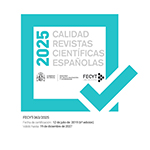Gender perspective and Social Work: Undergraduate or postgraduate proceedings in G-9 universities
Abstract
: Introduction. Since its origin, Social Work has been linked to the feminist struggle, besides being considered a feminized profession that Works mainly with women. Training from a gender perspective is a sine qua non condition to guarantee its incorporation into social intervention practices. Organic Law 3/2007, March 22th, for the effective equality of women and men that establishes the inclusión, in the appropriate study plans, of teachings on equality between women and men. Objectives. In this sense, the objective of the current work is to analyze the inclusion of this subject in the Social Work degrees of the public universities in the G – 9. Methodology. To do this, the article has analyzed the information provided by the university campuses about the educational offer at the undergraduate and postgraduate level. Likewise, a review of the Equality Units of the aforementioned universities has been carried out, paying special attention to the activities carried out related to social intervention. Results. It is found that training in gender perspective in Social Work is scarce, both at the undergraduate and postgraduate level. For its part, the Equality Units perform functions related to the specific competencies of Social Work, such as the preparation of diagnoses and plans, and dissemination, awareness – raising and strengthening of equality between men and women on university campuses. Conclusions and discussion.The research points to the need to strengthen gender training that allows to lay the foundantions of a feminist Social Work since it appears in a residual way, with a voluntaristic nature and low level of specialization, which prevents the comprenhensive training of social workers.
Downloads
Article download
License
In order to support the global exchange of knowledge, the journal Investigaciones Feministas is allowing unrestricted access to its content as from its publication in this electronic edition, and as such it is an open-access journal. The originals published in this journal are the property of the Complutense University of Madrid and any reproduction thereof in full or in part must cite the source. All content is distributed under a Creative Commons Attribution 4.0 use and distribution licence (CC BY 4.0). This circumstance must be expressly stated in these terms where necessary. You can view the summary and the complete legal text of the licence.











